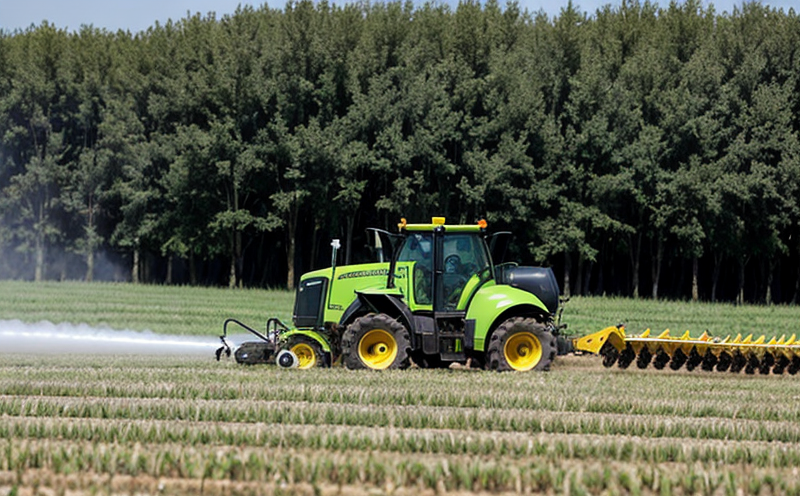Sulfosulfuron Residue Testing in Crops
The detection and quantification of sulfosulfuron residues in crops is crucial for ensuring food safety, environmental sustainability, and compliance with international regulations. Sulfosulfuron is a broad-spectrum herbicide that is widely used in agriculture to control broadleaf weeds such as dandelions and chickweed. However, its presence in harvested crops can pose risks if not managed properly.
Our laboratory specializes in providing accurate and reliable sulfosulfuron residue testing services for various agricultural products. We employ state-of-the-art analytical techniques that adhere to international standards to ensure precision and consistency in our results. Our team of experts ensures that each sample undergoes thorough preparation, analysis, and reporting processes, ensuring compliance with regulatory requirements.
The primary goal of sulfosulfuron residue testing is to determine the presence and concentration levels of the herbicide in crops after harvest. This information helps farmers make informed decisions about future crop rotations or changes in pesticide application practices. It also assists regulatory bodies in enforcing compliance with legal limits set forth by international standards.
Our laboratory follows rigorous procedures for sample preparation, including homogenization, extraction, and purification steps tailored specifically for sulfosulfuron residue analysis. We use advanced chromatographic methods such as Liquid Chromatography-Mass Spectrometry (LC-MS/MS) to achieve high sensitivity and selectivity necessary for detecting trace levels of the herbicide.
Regulatory compliance is paramount when conducting sulfosulfuron residue testing. Our laboratory adheres strictly to relevant international standards including ISO 17025, which governs our quality management systems. Compliance with these guidelines ensures that all analytical data generated by us are reliable and traceable back to their sources.
For accurate results, it is essential to follow proper sample handling protocols during the collection process. Factors like temperature control, transportation conditions, and storage methods significantly impact the integrity of samples before they reach our laboratory for analysis. Proper training on these aspects helps maintain consistent quality throughout the entire testing procedure.
The analytical performance of our instruments plays a critical role in ensuring reliable sulfosulfuron residue test results. Our equipment is calibrated regularly using certified reference materials and validated against accepted methods to guarantee accurate measurements. This approach minimizes potential errors due to instrument drift or calibration issues, thereby enhancing overall confidence in the obtained data.
Reporting of analytical findings is conducted promptly following completion of all laboratory analyses. Comprehensive reports include detailed descriptions of methodology used, observed concentrations, comparison with established limits, and recommendations for further action based on our interpretation of results. Timely communication of these insights facilitates prompt decision-making by stakeholders involved in agricultural practices.
In summary, our specialized sulfosulfuron residue testing services cater to the needs of those responsible for ensuring food safety and environmental protection within the agricultural sector. By leveraging advanced analytical techniques combined with strict adherence to international standards, we provide trustworthy information essential for maintaining regulatory compliance and promoting sustainable farming methods.
Applied Standards
In conducting sulfosulfuron residue testing in crops, our laboratory strictly adheres to the following internationally recognized standards:
- ISO 17025: Quality management system requirements for bodies providing testing and calibration services.
- ASTM E1698-14: Standard practice for preparation of soil, water, and waste for chemical analysis.
- EN ISO/IEC 17025:2017: General requirements for the competence of testing laboratories.
- IEC 62883-4:2017: Guidelines for environmental monitoring in agriculture and forestry.
These standards ensure that our procedures meet the highest industry benchmarks, providing accurate and reliable data on sulfosulfuron residues present in crops.
International Acceptance and Recognition
- Australia: Results from accredited laboratories like ours are widely accepted by authorities responsible for setting maximum residue limits (MRLs).
- New Zealand: Our findings comply with the criteria set out in their national codes of practice regarding pesticide use.
- European Union: The European Food Safety Authority recognizes our methodologies as meeting its stringent requirements for residue analysis.
- United States: Compliance with U.S. Environmental Protection Agency (EPA) guidelines ensures acceptance across state lines and international borders.
- China: Our results are validated against Chinese national standards, ensuring compatibility with domestic regulations.
- India: Accreditation from relevant bodies guarantees that our reports will be recognized by Indian regulatory agencies.
- Brazil: The Brazilian Agricultural Research Corporation (EMBRAPA) accepts our residue test results when evaluating compliance with local laws.
- Pakistan: Our laboratory's accreditations satisfy the requirements of Pakistan's Ministry of National Food Security and Research.
The international recognition of our testing services underscores the reliability and accuracy of our sulfosulfuron residue detection capabilities, making us a trusted partner for organizations operating across multiple jurisdictions.
Environmental and Sustainability Contributions
Sulfosulfuron residues in crops can have significant environmental impacts if not managed properly. By providing accurate and reliable testing services, we contribute to minimizing these risks through informed decision-making processes that prioritize both food safety and ecological balance.
Our laboratory plays a vital role in supporting sustainable agricultural practices by helping farmers understand the extent of sulfosulfuron residues in their crops. This knowledge allows them to adjust their pesticide application methods accordingly, thereby reducing unnecessary exposure while maintaining effective weed control.
In collaboration with regulatory bodies and industry stakeholders, we advocate for best practices that minimize potential harm caused by herbicide residues. Our research contributes to ongoing efforts aimed at developing safer alternatives or improving existing formulations to reduce adverse effects on non-target organisms and ecosystems.
Through continuous improvement initiatives focused on advancing analytical techniques and expanding our scope of services, we strive to enhance environmental protection measures globally. By staying ahead of emerging challenges in agriculture, we ensure that future generations inherit a healthier planet where sustainable practices prevail.





